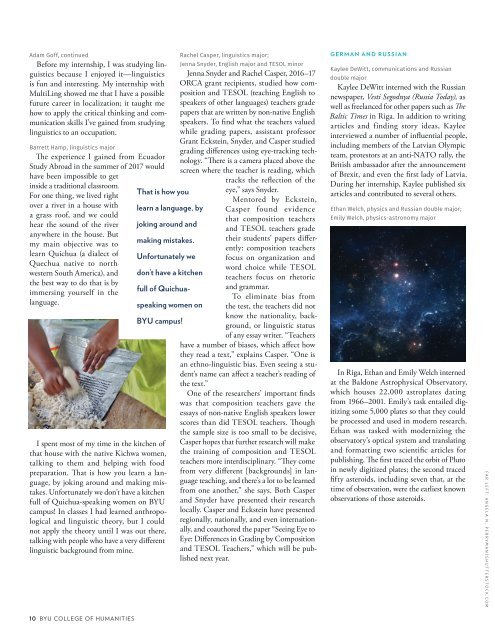Fall 2017
Create successful ePaper yourself
Turn your PDF publications into a flip-book with our unique Google optimized e-Paper software.
Adam Goff, continued<br />
Before my internship, I was studying linguistics<br />
because I enjoyed it—linguistics<br />
is fun and interesting. My internship with<br />
MultiLing showed me that I have a possible<br />
future career in localization; it taught me<br />
how to apply the critical thinking and communication<br />
skills I’ve gained from studying<br />
linguistics to an occupation.<br />
Barrett Hamp, linguistics major<br />
The experience I gained from Ecuador<br />
Study Abroad in the summer of <strong>2017</strong> would<br />
have been impossible to get<br />
inside a traditional classroom.<br />
For one thing, we lived right<br />
over a river in a house with<br />
a grass roof, and we could<br />
hear the sound of the river<br />
anywhere in the house. But<br />
my main objective was to<br />
learn Quichua (a dialect of<br />
Quechua native to northwestern<br />
South America), and<br />
the best way to do that is by<br />
immersing yourself in the<br />
language.<br />
I spent most of my time in the kitchen of<br />
that house with the native Kichwa women,<br />
talking to them and helping with food<br />
preparation. That is how you learn a language,<br />
by joking around and making mistakes.<br />
Unfortunately we don’t have a kitchen<br />
full of Quichua-speaking women on BYU<br />
campus! In classes I had learned anthropological<br />
and linguistic theory, but I could<br />
not apply the theory until I was out there,<br />
talking with people who have a very different<br />
linguistic background from mine.<br />
10 BYU COLLEGE OF HUMANITIES<br />
That is how you<br />
learn a language, by<br />
joking around and<br />
making mistakes.<br />
Unfortunately we<br />
don’t have a kitchen<br />
full of Quichuaspeaking<br />
women on<br />
BYU campus!<br />
Rachel Casper, linguistics major;<br />
Jenna Snyder, English major and TESOL minor<br />
Jenna Snyder and Rachel Casper, 2016–17<br />
ORCA grant recipients, studied how composition<br />
and TESOL (teaching English to<br />
speakers of other languages) teachers grade<br />
papers that are written by non-native English<br />
speakers. To find what the teachers valued<br />
while grading papers, assistant professor<br />
Grant Eckstein, Snyder, and Casper studied<br />
grading differences using eye-tracking technology.<br />
“There is a camera placed above the<br />
screen where the teacher is reading, which<br />
tracks the reflection of the<br />
eye,” says Snyder.<br />
Mentored by Eckstein,<br />
Casper found evidence<br />
that composition teachers<br />
and TESOL teachers grade<br />
their students’ papers differently:<br />
composition teachers<br />
focus on organization and<br />
word choice while TESOL<br />
teachers focus on rhetoric<br />
and grammar.<br />
To eliminate bias from<br />
the test, the teachers did not<br />
know the nationality, background,<br />
or linguistic status<br />
of any essay writer. “Teachers<br />
have a number of biases, which affect how<br />
they read a text,” explains Casper. “One is<br />
an ethno-linguistic bias. Even seeing a student’s<br />
name can affect a teacher’s reading of<br />
the text.”<br />
One of the researchers’ important finds<br />
was that composition teachers gave the<br />
essays of non-native English speakers lower<br />
scores than did TESOL teachers. Though<br />
the sample size is too small to be decisive,<br />
Casper hopes that further research will make<br />
the training of composition and TESOL<br />
teachers more interdisciplinary. “They come<br />
from very different [backgrounds] in language<br />
teaching, and there’s a lot to be learned<br />
from one another,” she says. Both Casper<br />
and Snyder have presented their research<br />
locally. Casper and Eckstein have presented<br />
regionally, nationally, and even internationally,<br />
and coauthored the paper “Seeing Eye to<br />
Eye: Differences in Grading by Composition<br />
and TESOL Teachers,” which will be published<br />
next year.<br />
GERMAN AND RUSSIAN<br />
Kaylee DeWitt, communications and Russian<br />
double major<br />
Kaylee DeWitt interned with the Russian<br />
newspaper, Vesti Segodnya (Russia Today), as<br />
well as freelanced for other papers such as The<br />
Baltic Times in Riga. In addition to writing<br />
articles and finding story ideas, Kaylee<br />
interviewed a number of influential people,<br />
including members of the Latvian Olympic<br />
team, protestors at an anti-NATO rally, the<br />
British ambassador after the announcement<br />
of Brexit, and even the first lady of Latvia.<br />
During her internship, Kaylee published six<br />
articles and contributed to several others.<br />
Ethan Welch, physics and Russian double major;<br />
Emily Welch, physics-astronomy major<br />
In Riga, Ethan and Emily Welch interned<br />
at the Baldone Astrophysical Observatory,<br />
which houses 22,000 astroplates dating<br />
from 1966–2001. Emily’s task entailed digitizing<br />
some 5,000 plates so that they could<br />
be processed and used in modern research.<br />
Ethan was tasked with modernizing the<br />
observatory’s optical system and translating<br />
and formatting two scientific articles for<br />
publishing. The first traced the orbit of Pluto<br />
in newly digitized plates; the second traced<br />
fifty asteroids, including seven that, at the<br />
time of observation, were the earliest known<br />
observations of those asteroids.<br />
FAR LEFT: ANGELA N. PERRYMAN/SHUTTERSTOCK.COM


